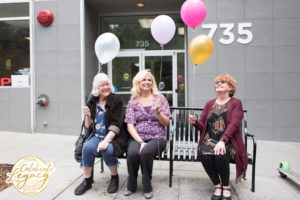 Top 3 Ways to Reconnect with Parents After 80
Top 3 Ways to Reconnect with Parents After 80
I am very blessed to have a close relationship with my parents my whole life. As they aged our relationship changed but was still so much of a blessing. What I found is that the need of my parents hasn’t changed even though I am a parent myself. There are things that my parents can only give me that no one else is able. Whenever I feel sick I want my dad to rub my tummy. When I want to celebrate they are still the first I want to call.
Now I realize that not everyone has the same relationship I have had with my parents. However, one thing I am aware is that many feel a shift with their parents at age 80. The parent begins to need the child. In my case my mother’s need came in the form of feeling lost without her spouse after his death. Suddenly things she had always handled as a “we” were difficult. We first navigated those things together. Many of the things my father had managed or decisions they would make were out of my wheelhouse. We would decide together what was best for her now and then what would they have done together. This happened dozens of times.
Then my mother had to navigate life on her own. As she navigated this new life as a single woman in her late 70’s I navigated ways to help her and reconnect with her in a special way. I share these special ways with you right now.
- Fold your parents into traditions. I am a mother with children in elementary but most adults that have parents over 80 have families that are grown and have their own grandchildren. Meaning that the parents are not as integrated in the special things in their life. While you are disconnecting from your parents, your parent’s world is becoming smaller. They are worrying more about doctor’s appointments. Aches and pains concern them more than staying active and engaged. Additionally, vision and hearing are beginning to limit their ability to stay connected with peers in the same way. An easy way to help parents and reconnect is to blend the senior parents into your special traditions. My mother comes over on Christmas Eve and stays the night so she can watch our children open their presents. We have family movie night and at least once a month she is invited to attend. She has shared these traditions allow her to have things to look forward to and that keeps her feeling relevant and involved.
- Call your parents for no reason. Many families find that with all of this technology they simply do not take the time to call someone “just because”. Yet the just because calls are awesome. If you really want to give a special meaning and connection do this call on a set day of the week. And do not make the call about you. Ask you parent(s) how things are going. Find out what they may need help with and if there are things you can help solve. Telling a parent about your own struggles is also huge. Let them lend you sage advice.
- Plan a special time together that includes your parents at least annually. My parents were always involved in one weekend getaway a year. When my father died my mother became involved in our Spring Break tradition. My parents would talk about looking forward to this special event all year long. When my father died my mother said planning for that trip helped keep her positive. The time will benefit your family as well as your parents. I often have my mother get asked questions about her childhood from my children so that the heritage she comes from can be passed down to them to appreciate.
Whether you were close to your parents or not these 3 simple things will help you stay connected or reconnect with your parents.
Lisa Doyle is a Registered Nurse who has worked in geriatrics most of her career. She works as a care manager and placement navigator in Washington state. Helping families navigate the world of long-term care. She provides support and family mediation when a family is unsure what to do next. She founded CayCare in 2005. Lisa has worked with traumatic brain injuries, spinal cord injuries and dementia. She has worked closely with clients who have Multiple Sclerosis, Strokes and Parkinson’s as well. To learn more about what Lisa and CayCare does go to www.caycare.com
There are also specialty courses available online for planning ahead before seeing an elder law attorney. She also teaches facilities how to best work with seniors and their families. To purchase one of her courses, go to www.caycare.com/ondemand

